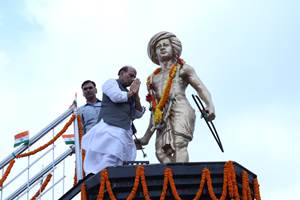The ongoing unrest in Jammu and Kashmir is no longer a headache PM Narendra Modi or the state’s CM Mehbooba Mufti should tackle while the Opposition can continue to indulge in war of words. Any violence in the country should be a matter of concern for all leaders who vow to serve the people. But such is the nature of politics in the garb of democracy, that violence seldom generates real concern among politicians. However, the Kashmir unrest, which has been continuing for more than a month now, provides leaders across political parties only two alternatives — either mend their ways or risk losing legitimacy.
The violence in the Valley may have been stopped till now, if not for politics. When it started after Hizbul commander Burhan Wani’s encounter by security forces on July 8, the Opposition parties gunned for the Centre and the state government, blaming them entirely for the unrest, though reports suggested there was a Pakistani hand behind the escalating violence.
ALSO READ: Will the Kashmir problem prove PM Narendra Modi’s ‘Shining India’ moment?
Even as Pakistani PM Nawaz Sharif spoke openly in support of Kashmir protesters and LeT chief Hafiz Saeed organised a mock funeral of Wani, politicians in India continued with the usual blame-game. There was a lot of hue and cry over the use of pellet guns on protesting civilians and the Opposition tried to corner Modi government over the issue both on streets and inside the Parliament. Truth is that security forces would have reacted similarly if the Congress was ruling the Country or the National Conference of Omar Abdullah was ruling the state. Moreover, if in Opposition, the BJP would have also reacted similarly.
I will be staying at the Nehru Guest House. Those who believe in Kashmiriyat, Insaniyat and Jamhooriyat are welcome.
— Rajnath Singh (@rajnathsingh) August 24, 2016
However, Kashmir unrest can no longer be dealt with usual politics. A bit of this has perhaps dawned on Abdullah, who came to Delhi on a 3-day visit and met several leaders including PM to talk about problems in the valley. Abdullah’s move was different from the usual, perhaps because of the toughened stance of Modi and Mufti. In a first, Abdullah even took to the Twitter, thanking Modi for giving him time to discuss the Kashmir issue.
The Kashmir unrest has thrown up an unprecedented challenge for the political class at a time when they can no longer escape public scrutiny easily. With access to social media to everyone who can afford, acts of politicians are discussed and judged daily by people more than ever in history. If politicians fail to stop the unrest and bring peace to the Valley soon, people across the country may start questioning their ability to ensure peace.
Kashmir no longer requires usual politics. It needs a leap of faith. Will Union Home Minister Rajnath Singh, who is visiting Kashmir today, and other stakeholders be able to do so?


